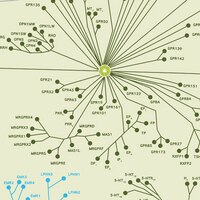HTS100M Sigma-AldrichChemiSCREEN™ Human δ Opioid Receptor Membrane Preparation
Human Delta / OP1 / DOP / DOR GPCR membrane preparation for Radioligand binding Assays & GTPγS.
More>> Human Delta / OP1 / DOP / DOR GPCR membrane preparation for Radioligand binding Assays & GTPγS. Less<<Recommended Products
Overview
| Replacement Information |
|---|
Key Spec Table
| Species | Host Cells | Protein Target |
|---|---|---|
| Human | Chem-1 | Delta / OP1 / DOP / DOR |
| References |
|---|
| Product Information | |
|---|---|
| Format | Membranes |
| Presentation | One package contains enough membranes for at least 200 assays (units), where a unit is the amount of membrane that will yield greater than 4-fold signal:background with 3H-labeled DADLE at 0.9 nM Liquid in packaging buffer: 50 mM Tris pH 7.4, 10% glycerol and 1% BSA with no preservatives. Packaging method: Membranes protein were adjusted to 1 mg/mL in packaging buffer, and dispensed at 1 mL/vial. Vials were rapidly frozen, and stored at -80°C. |
| Quality Level | MQ100 |
| Physicochemical Information |
|---|
| Dimensions |
|---|
| Materials Information |
|---|
| Toxicological Information |
|---|
| Safety Information according to GHS |
|---|
| Safety Information |
|---|
| Storage and Shipping Information | |
|---|---|
| Storage Conditions | Store at –70°C. Product is stable for at least 6 months from the date of receipt when stored as directed. Do not freeze and thaw. |
| Packaging Information | |
|---|---|
| Material Size | 200 units |
| Transport Information |
|---|
| Supplemental Information |
|---|
| Specifications |
|---|
| Global Trade Item Number | |
|---|---|
| Catalogue Number | GTIN |
| HTS100M | 04053252323379 |
Documentation
ChemiSCREEN™ Human δ Opioid Receptor Membrane Preparation SDS
| Title |
|---|
References
| Reference overview | Pub Med ID |
|---|---|
| Behavioral effects of delta-opioid receptor agonists: potential antidepressants? Broom, Daniel C, et al Jpn J Pharmacol, 90:1-6 (2002) 2002 | 12396021
 |









